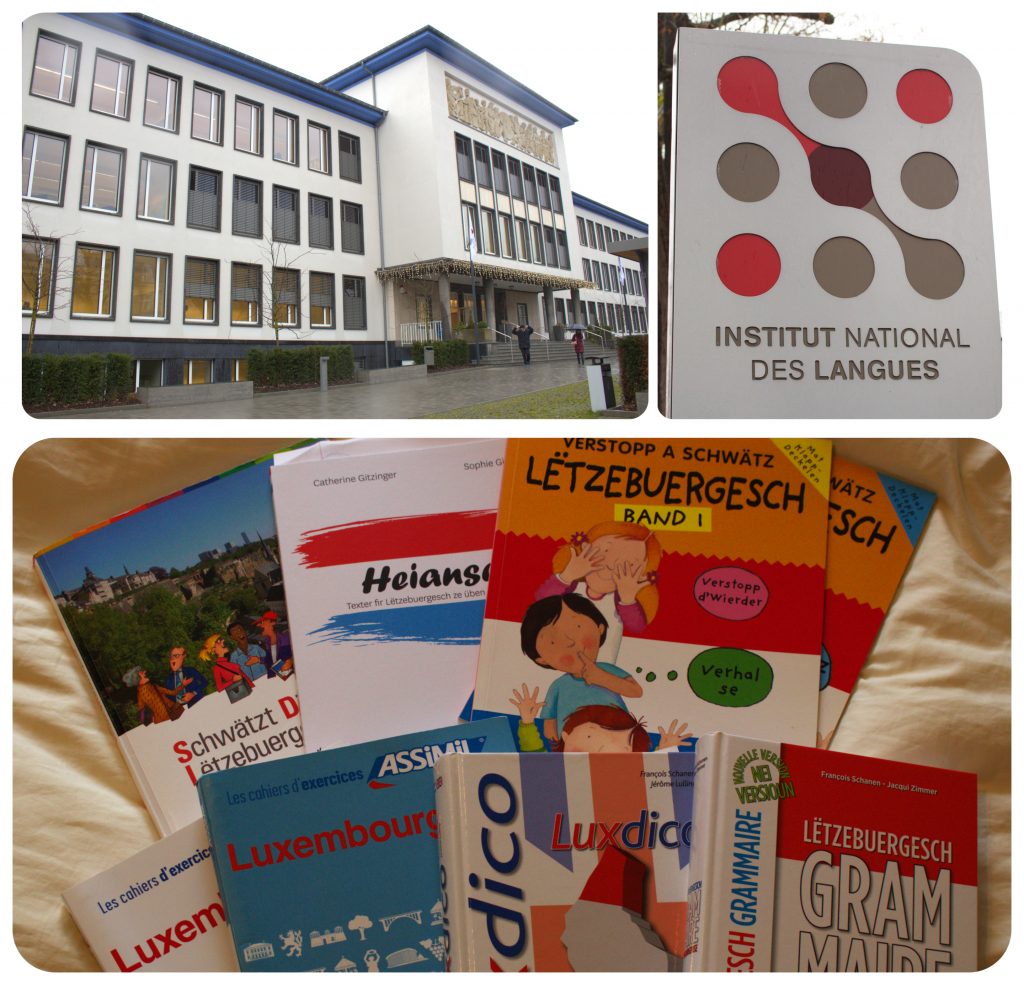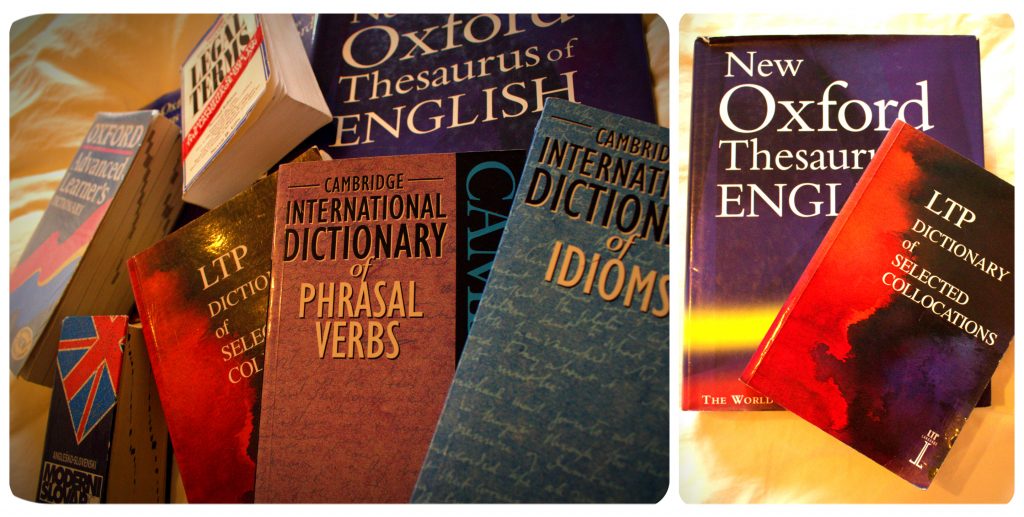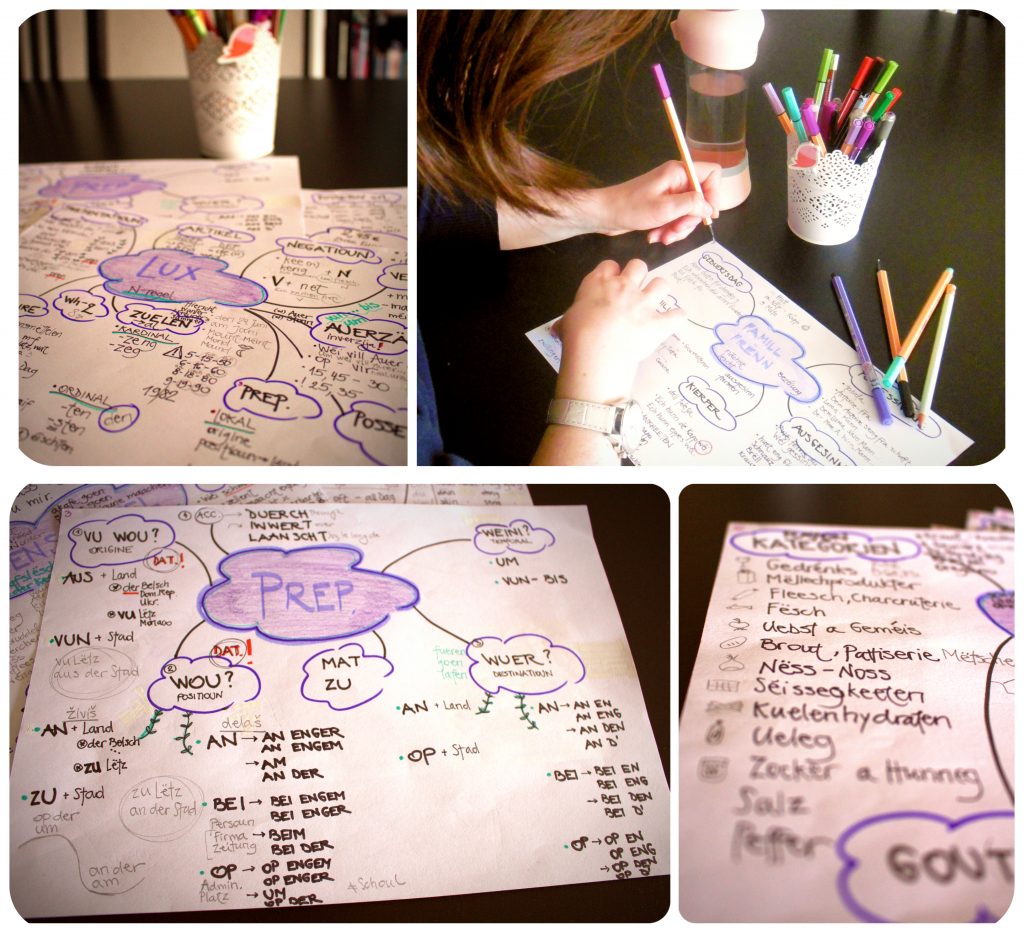I’m back at school!
Conquering Lëtzebuergesch has become quite essential for my survival in the duchy’s wilderness so here I am, teacher-turned-student, intensively absorbing the Sprooch of my adoptive country. In reality, I started years ago, just after I had attained the level of French which makes it possible to spy on my children. Now, however, Luxembourgish is making its presence be known in their everyday conversation, thus notebook and pen in hand, with an open mind, I am ready to take on this challenge.
My new role has made me think of the different ways in which I have acquired foreign languages thus far and about the tricks I have used as a teacher to help my students. Wanting to have other people’s input, I’ve thrown myself into research and here is what I came up with.

1. JOIN A COURSE I know, I know. There are numerous apps and sites which make it possible to learn languages for free, while language courses cost the equivalent of a kidney. But unless your motivation is at a star level, you will not be consistent; and consistency is key in (language) learning! Opting for a classroom instead of your living room makes you accountable to your teacher, to your classmates and to yourself. Usually, there’s a final test and you sure do not want to fail! 🙂 Also, it forces you to go out into the world and interact with other people in the same situation; it’s not only about communication opportunities but also about feeling less alone when frustration hits. Finally, you have an expert at your disposal at all times for any doubts or questions, which is one of the most important prerequisites of success.
2. SET SMART GOALS Which stands for Specific, Measurable, Attainable, Relevant, and Time-bound. Each of these variables is highly subjective and personalizable but be sure to put it in place before starting. Most importantly, decide in advance what is your goal, what does it mean ˝to learn a language˝ in your specific situation. It is always a good idea to fish out the Common European Framework of Reference for Languages and check what each level encompasses, then decide up to where you want to go.
3. TAKE A PLUNGE INTO IMMERSION Create as many opportunities as you can where you’ll be able to listen to, read and speak the language. It may be as simple as starting following a Youtuber whose mother tongue your new language is, subscribing to a newspaper or blog or find an online friend with whom to skype regularly. Go to your local library and find a book or order one for your Kindle. My radio of choice lately has been a Lëtzbeurgesch one. I can’t say I understand much but it’s still a nice companion during the rides to and from the after-school activities.

4. SPEAK and MAKE MISTAKES It goes without saying that all beginnings are tough. You will massacre the language and feel like a fool doing it. You will know exactly what you want to say, the exact nuance you want to convey but find yourself completely helpless and utterly unable to do it. It comes with the territory; be patient with yourself! ˝We are here to make mistakes˝, is what one of my University teachers told the class at the very beginning of our first lecture. Remembering how empowering it was to hear that, I now like to say that to my students. ˝Embrace making mistakes; I go out of my way to make at least 200 a day! This way I know I am truly using and practicing the language,˝ says polyglot, blogger, and author of the controversial book Fluent in 3 Months – https://tim.blog/2014/03/21/how-to-learn-a-foreign-language-2/. What is great about learning a new language, among many other things, is that it always turns out to be an utterly humbling experience.

5. GET A DICTIONARY It can be an online one but you will need to have a dictionary at hand. You cannot rely solely on your teacher for every unknown word. Especially if you’re planning to do any self-study, you will encounter words you had never met before. The dictionary is also your best friend when it comes to correct pronunciation for each word, as long as you are familiar with the basic IPA. If you want to go further, there are also collocation dictionaries out there, as well as thesauruses, dictionaries of opposites and many many more. Dearest to my heart? The collocation dictionary, closely followed by my Thesaurus. Yes, I do have a favourite dictionary. And yes, I did devise a rating scale for all of them.
6. FIND A GOOD TEACHER Teachers play such a paramount role not only in motivating their students but also in the quality of the teaching they offer. I’ve had absolutely adorable people teaching me but as lecturers, they left a lot to be desired. Also, a common misconception is that choosing a native speaker is important above anything else. I would never dare to teach Slovene; I’d fail spectacularly at it! Since I’ve never properly studied it, except for my own use, I’ve never learnt the grammatical rules and concepts by hard so if a learner asks me about the use of the future tense in Slovene I’d be lost. But try asking me the same question about the English language! Another fact to keep in mind is that a good teacher is not necessarily the foremost expert in the field – again, I’ve had teachers who knew their field of knowledge inside out but couldn’t transfer that knowledge to save their life! So… choose wisely.
7. TYPES OF LEARNERS Not only the teacher, but the learner is important as well. Namely, the type of learner you are. There are four main types – the visual, the auditory, the kinesthetic and the reading/writing type. Most people are a mix of a few but I know for myself to be a strongly visual one, meaning just listening does not work for me, I have to see it written down, preferably in a very aesthetic and organised way. Mind mapping and neat lists work wonders for me! Once you know how you learn best, the process becomes much easier and more efficient.

8. BREAK IT DOWN Learning a whole system of communication that has developed throughout thousands of years seems like a daunting task. It’s overwhelming! Therefore, change your point of view; focus on each chapter, each lesson. First the basic greetings, then the numbers, followed by being able to tell someone where you come from. Take baby steps and breath. Deeply.
9. PRACTICE MAKES PERFECT Just attending the classes and shoving the books in the corner as soon as you’re home, does not suffice. Be it revising, filling in your exercise book or going for a coffee with one of your classmates to speak the target language, your goal should be to keep your mind engaged.
Now, during my research, I’ve come across many sensationalistic claims such as the one that you can be fluent in just a few months while also sounding like a native speaker. It is justified by the fact that cognates abound in the European languages and by the data that in English ˝300 words make up 65% of all written material˝, therefore you do not need to learn ALL the words of a language, just the useful ones. Another highly questionable advice is to just watch some YouTube videos and learn the pitch of native speakers simply by listening or that the goal of learning the language in a year is way too long of a time limit. While I do believe some people are more gifted than others and a few months are enough for some to acquire enough knowledge to hold a basic conversation in a foreign language, I highly doubt the conversation could be very complex or that they could be mistaken for a native of that language. However, there’s no harm in trying and you have to make the decision to use whichever method works best for you.
I have, however, come across very useful advice, as well, such as using mnemonics and flashcards, not giving up upon the first obstacle and to have internal monologues, which all of us do, in the new language.
In the end, a few quick tips to follow are to watch for accuracy over speed (the one that is excruciatingly difficult for me to follow), to try to speak with native speakers whenever you get the chance to and absorb all you can, be it the accent, expressions, words or specific grammatical constructions. Speaking of grammar, do learn it, try to understand why the language uses a certain way of expressing instead of another, what hides in the background. If you ignore the rules, all you are left with is an endless heap of expressions to memorize one after another; at a certain point, you will run out of memory space. Also, once you reach a higher level and start reading books, resist the urge to check every unknown word; try to figure it out from the context or to compare it to a cognate in your native tongue. The ones you do check, write down in a notebook and revise regularly.
It’s a wonderful adventure, dipping into a foreign tongue, where you gain knowledge not only of the language but acquire also an insight into another culture and its customs, a different way to see the world and live your life. I have never eaten as much cheese (or drunk as much wine) as I have been since moving to this Franco-German mix of a country and starting to acquire the language of the Gauls.

I wish you all an enjoyable and successful dipping!
L